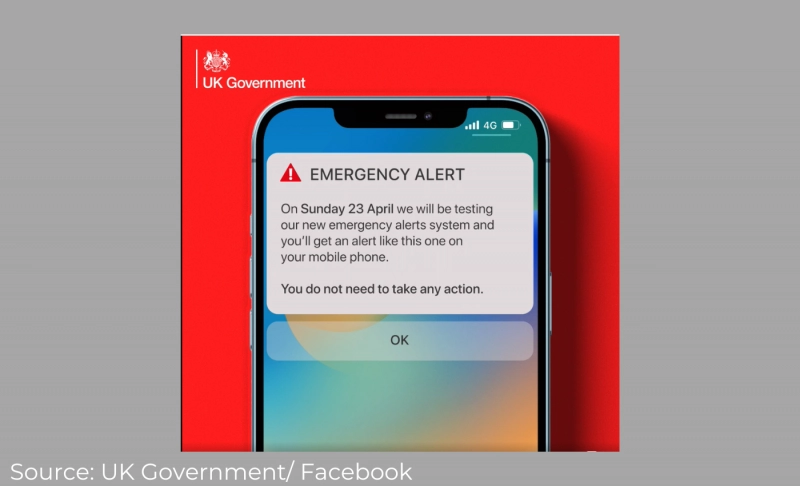By: Vivek J
March 24 2023

Users will get a notification of the alert which they only need to acknowledge. They can't reply to it and their phone's function cannot be altered.
Context
The U.K. government will conduct a nationwide emergency alert service test on April 23, 2023. This test aims to warn people about any danger nearby in the event of severe flooding, fires, or extreme weather. Details on the trial of the emergency alerts service have been made public by the U.K. government.
As the government plans to roll out the emergency alert service, a video has been circulating online with claims that the government will limit phone services if people do not respond to the emergency alerts. In the video, a man can be heard saying: "You are gonna receive a text message on your phone. If you don't reply to the text message, your phone use will be limited. So they are gonna cut your phone off all the day (sic)." He then went on to question the intent behind such test services and advised people to be wary of such attempts by the government to test people's compliance. This video has been shared with multiple narratives on social media where users have misrepresented how the trial works; some even claimed that the government would tamper with people's phones and install spyware or a virus. However, these claims made on social media are incorrect.
In Fact
A statement published by the U.K. government on March 19 notes that a nationwide alert test would be conducted in the early evening of Sunday, April 23, 2023, as part of which people would receive a test message on their mobile phones. It noted that the alerts would come from a government or emergency service, which would issue a warning, give details of the impacted area, and provide instructions on how best to respond.
Another government document on the emergency alert FAQs details how the test would take place on April 23. A loud siren-like sound will appear on people's phones, automatically stopping after 10 seconds. It clearly states that people do not need to take action upon receiving the emergency test alert on April 23. "A welcome message will stay on screen until you acknowledge it, just like a 'low battery' warning," the government clarification said.
To get more details about testing of emergency alert service, Logically reached out to the U.K. Cabinet Office. Alexandra Newlands, senior press officer at the U.K. cabinet office, told us, "The test message will appear on your device's home screen— all you need to do is simply acknowledge it by pressing 'ok'— like you do for a 'low battery' warning - and continue to use your phone. You cannot reply to the test message." She also confirmed that the alert system does not compromise personal data. "The Emergency Alerts system uses cell tower technology to reach phones in a defined geographical area - it is not a text message - it in no way accesses or uses personal data," she said. She also clarified that the emergency alert would not disable any functions on people's phones. When asked if people can opt out of the emergency alerts, she said, "You can opt out of the Emergency Alerts system in your phone's settings - just search for 'emergency alerts,' and turn off 'severe alerts' and 'extreme alerts.' However, these alerts are potentially life-saving, so we recommend you keep them switched on." As part of the new system, an alert would appear on the phone's home screen, following which people are expected to follow the safety instructions in it.
The emergency alert service is intended to warn people of potential dangers using cell tower locations in designated areas. Phone users cannot respond to the alert and need to acknowledge the message and continue using their phones as usual. The government claimed that similar services have already been implemented in countries like the U.S., Canada, the Netherlands, and Japan and have been widely credited with saving lives, especially during extreme weather events.
The Verdict
A video shared on social media claims that phone users in the U.K. will have limited access to their phones' services if they do not reply to the text message sent as an emergency alert. According to the U.K. cabinet office, the test message will appear as a notification on the phones' home screen, and users need to acknowledge the message but cannot reply. Therefore, we mark this claim false.